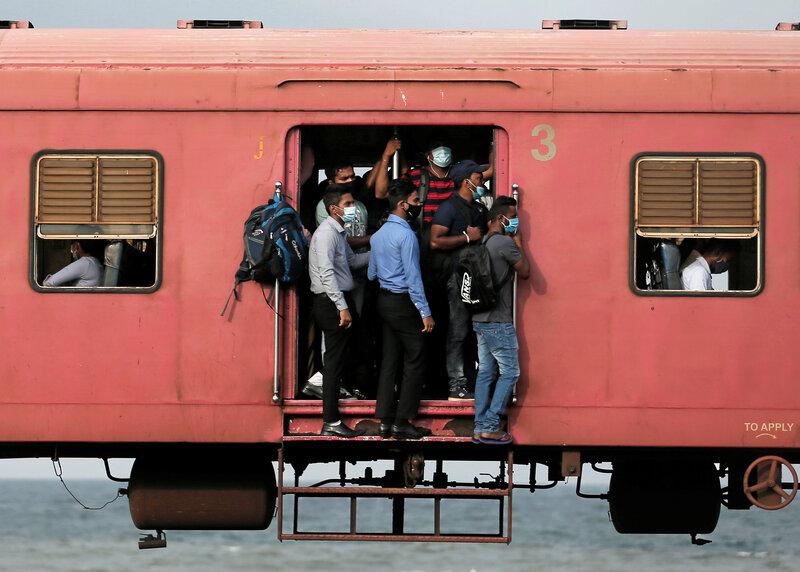31 Oct 2020 - {{hitsCtrl.values.hits}}

By Yoshitha Perera
Sri Lanka’s Covid-19 cases have surged with the total number of cases now reaching over 8000. The country is currently on the verge of community transmissions and further negligence could lead to detrimental situations including the rise of unusual and untimely deaths, according to experts.
As the Police extended its ‘quarantine curfew’ in several districts in order to trace the immediate contacts of the two of the recent large clusters emerging from the Brandix-owned factory in Minuwangoda, Gampaha and the fish market in Peliyagoda, the country’s Epidemiology unit states that no isolated cases have been reported outside the two main clusters. There has been no official acknowledgement that there is a community spread even with the numbers of cases rising rapidly.
In this backdrop the Government Medical Officers Association (GMOA) has presented a new COVID-19 exit strategy to President Gotabaya Rajapaksa detailing how to control the current pandemic spread in the country.
Speaking to the Daily Mirror Insight GMOA’s General Secretary Dr. Haritha Aluthge said that the report on the previous exit strategy was handed over to the President on April 4, 2020 but with the current COVID-19 situation, the association has revised its previous recommendations.
Accordingly, the current exit strategy recommends ‘The Hammer and Dance’ mechanism as the best method to manage the spread of COVID-19 in the country. It also highlighted that in managing public health emergencies; there should be efficiency within the three main elements, political leadership, health capacity, and public compliances.

The current COVID-19 situation; what led us here?
Highlighting the reason for the current COVID-19 outbreak in the country, Dr. Haritha Aluthge said that the failure in taking appropriate decisions at the correct time is the main reason for the current situation in the country.
“The World Health Organization (WHO) stated that overreaction is better than the delayed reaction, but in Sri Lanka we always see a delayed reaction when it comes to decision making especially when it comes to this pandemic situation. It is a sad plight,” Dr. Aluthge said.
Aluthge said that currently, the country is on the edge of community transmission of COVID-19 and managing the present situation to prevent community spread is the biggest challenge the country is facing presently.
“There is no shame in overreacting to prevent the spread of COVID-19 because it’s different; it spreads more rapidly, including via asymptomatic hosts. When it strikes hard, there is a need of ICU treatments for the patients, and within a small period of time it can also overwhelm hospitals,” he said.
Dr. Aluthge said that the country has reported three COVID-19 related deaths within a short period, after the emergence of the two main clusters. He stressed that the situation can take a terrible turn if community transmission is not prevented.
“What we can expect from this situation is, if we once again fail to take right decisions on time, there can be a rise of unusual deaths within the next two months,” he said.
According to the GMOA’s COVID-19 exit strategy, the Hammer and Dance mechanism is the best method to manage the present COVID-19 numbers in Sri Lanka. It includes ten possible methods and practices.
It recommends a mix of at least 80% of social distancing, minimizing travel between cities, isolation of confirmed cases, more than 80% of contact tracing, widespread testing, minimizing travel to common places, effective treatment, and closure of port of entries. Finally it also recommends vaccination or prophylaxis (Preventive healthcare).
Dr. Aluthge said that given the present situation the numbers are rising exponentially, stressing the need for the government to implement immediate steps to prevent further spread of the virus. In the report the GMOA also highlighted that these numbers indicate a different, rising trend of the pandemic; suggesting that the existing management mechanism needs to be re-visited for further management. Following are a few other areas they chose to highlight following analysis of the present management methods and practices.
● Hospital beds are declining in number and hospital resources are exhausted
● Hospitals are exposed affecting proper care delivery
● Quarantine centers are over-burdened
● Army personnel are more exposed and over worked
● Economy is affected and facing consequences due to current management of COVID
Dr. Aluthge said that in the revised COVID-19 exit strategy, the GMOA had pointed facts related to six key areas such as surveillance strategy, quarantine policy, treatment centre policy, zonal prescription and strategy to shrink Red Zones, boosting immunity, and risk communication.
He said that as an immediate measure the government has to implement the Border Crossing Prescription and to minimize people entering into the COVID-19 vulnerable areas. “We saw that people are also less responsible when it comes to taking health precautions. They are trying to cross the cities and trying to conduct their daily work. In this situation, the government has to implement laws considering above mentioned approaches,” he said.
Dr. Aluthge pointed out that in this context zonal lockdown, zonal governance and maintenance, and zonal exit (moving from red zone to green) is vital. Re-designing of the quarantine policy is also important because the majority is being identified as asymptomatic.
He also added that at present with rapid increase of a number of cases there is a limitation in PCR testing facilities, while the number of available health staff is on the decline, capacity in hospitals are limited, and the country may not have the capacity to mange another island wide lockdown due to economic aspects and other concerns. Therefore, an updated operational mechanism is now needed to manage the current phase of the COVID-19 pandemic in the country.
Responding to the question on when can we see a decline in the present COVID-19 clusters, Dr. Aluthge said that within the given situation it is hard to explain a time frame on subsiding the present cluster. However the GMOA is expecting that it would take a considerable time to see a decline of the present situation.
“The spread of the virus this time can worsen any time. We always have to keep the attention on the red zones in the country and have to develop testing facilities,” he said. He added that if the situation gets worse, even though it is not the best decision, the government has to go an automatic and immediate island wide lockdown.
29 Dec 2024 1 hours ago
29 Dec 2024 4 hours ago
29 Dec 2024 4 hours ago
29 Dec 2024 5 hours ago
29 Dec 2024 7 hours ago